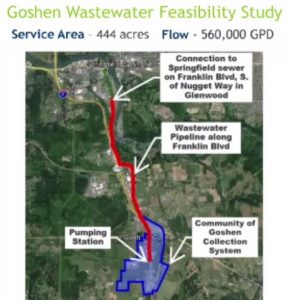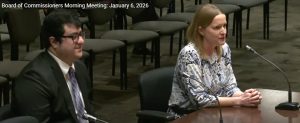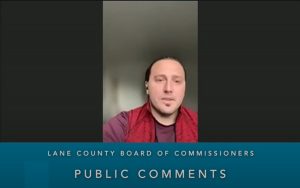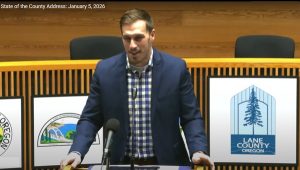Legislators asked to bypass all land use rules, approve IMERF waste site
12 min read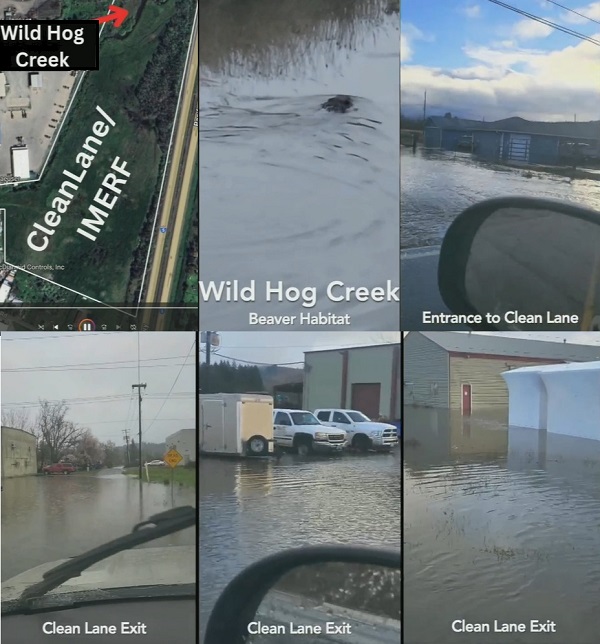
Presenter: A land use hearings officer ruled in late April that the proposed CleanLane IMERF, or Integrated Materials and Energy Recovery Facility, cannot be built in the Goshen light industrial zone. Lane County officials appealed to Eugene Democrats in the legislature, and late in the session, they introduced a bill that would force approval of the IMERF site.
At the public hearing on HB 3971 May 21, Lane County Commissioner Laurie Trieger:
Laurie Trieger (Lane County, commissioner): Our ability to proceed is now hampered by a concerted attempt to use Oregon’s open space and environmental protection laws as a cudgel against this critical project.
[00:00:39] Presenter: A Lane County spokesperson said Commissioner Trieger then referred to the company Waste Connections:
[00:00:46] Laurie Trieger (Lane County, commissioner): A core issue that is actually at play here is this: the growing market power seeking to control solid waste management in Oregon. Across the U.S., local hauling companies are increasingly being acquired by a national conglomerate while continuing to operate under familiar names. This entity aspires to exert monopoly control over the solid waste and recycling business into the future to the benefit of private shareholders.
[00:01:12] Presenter: Also testifying to the House Committee on Rules, Lane County Commissioner Pat Farr:
[00:01:17] Pat Farr (Lane County, commissioner): CleanLane is among the most forward-looking projects that I’ve had the opportunity to work on in my years of public service. Not only does this project extend the lifespan of Short Mountain landfill, it will do so by diverting 80,000 tons of material to more beneficial use each and every year.
[00:01:35] A partner for this project, Eugene-based Bulk Handling Systems (located in my Bethel neighborhood), has supplied the equipment for materials recovery projects around the country and abroad.
[00:01:47] For this project, they’re putting up 70% of the total projected cost: $115 million investment against the $35 million that Lane County will put forward. The two-year construction project is creating 190 high-paying manufacturing jobs during construction, and once we open, 65 ongoing family-wage jobs for the operation of the facility.
[00:02:09] We’re now in need of your help to bring this worthwhile project home.
[00:02:13] Presenter: Lane County Counsel Rob Bovett:
[00:02:15] Rob Bovett (Lane County, county counsel): I thought I’d talk a little bit about why this is, the timing is an emergency. It is critical we get this bill moving and this project moving forward.
[00:02:25] Our land use system is a great system. And I think it works wonderful, but in many cases, zoning ordinances didn’t anticipate modern technology such as IMERF. We need a place to site the IMERF and we need a place to site the IMERF sooner rather than later so we can accomplish the goals the legislature has set out.
[00:02:45] So as a matter of timing, I think this fits perfectly within what you’ve done in the past for supersiting.
[00:02:52] As the crafter of this bill, I really just lifted provisions lock, stock, and barrel out of existing supersiting bills and legislation, some that is permanent. For example, I pulled a lot of it out of (ORS) 197.783, which you passed a few years ago to provide for siting of emergency shelters.
[00:03:14] So I’ll leave it there, but I’ll just reiterate: This bill does not bypass any other required approval such as environmental permitting, wetlands, any of the sort. This is all about timing.
[00:03:25] Presenter: Addressing the panel of bill supporters, Rules Committee Vice Chair Rep. Christine Drazan:
[00:03:32] Rep. Christine Drazan: It is a land use bill. This is May, and it’s being heard for the first time in the Rules Committee. And not only that, but we’re talking about Oregon’s long-term demonstrated leadership on solid waste management, environmental issues, while completely just bowling over our decades-long leadership in land use planning. And so I would love it if you guys could help me understand why you’re coming to the legislature to sidestep land use laws and request supersiting in May…
[00:04:08] This just feels like some people that have some political power exerting it to bypass a LUBA decision.
[00:04:15] I keep hearing the bill is really about timing and that the bill does not bypass any laws or any permitting, it is a matter of statewide concern, yet it limits the benefit only to Lane County.
[00:04:25] This panel has said that this bill is about this idea that you are still going to have local control, you’re still going to have all this local process, and yet ‘notwithstanding any provisions of ORS Chapter 92, 195, 197, and 215‘— entire chapters, which includes subdivisions and partitions, local government and planning coordination, comprehensive land use planning and county land use planning are all exempted, ‘notwithstanding any provision.’
[00:04:54] And so, I don’t—you know, land use isn’t my thing necessarily. It’s not that I think supersiting is the worst thing in the world. I find this to be pretty disingenuous when the language of the bill is clear and the testimony of the group is, ‘Don’t worry about any of that stuff, little lady. This is just timing. It’s okay.’
[00:05:15] So I just want to push back just a little bit on the actual language of the bill and get back to what we’re actually doing here, which is setting aside everything that everyone else has to go through, because there’s been a decision made at Lane County, based on testimony today, that we have concerns about private businesses and that we would rather take an anti-corporate position in Lane County relative to how you do waste management.
[00:05:39] And you would rather have this approach because it meets larger goals that you have within the county, and I get that, and I have clearly understood that today, but I think it’s really important to look at the language of the bill in front of us that very clearly says: We are exempting all of the requirements of these provisions. ‘A county shall approve the following,’ and on we go.
[00:06:00] Presenter: Rules Committee member, Rep. Lucetta Elmer:
[00:06:04] Rep. Lucetta Elmer: I mean House Bill 3971, it’s going to allow this to happen without complying to land division laws, wetland laws, land use laws, county requirements, LCDC planning goals, local zoning and metro rules. That’s a lot to just say we’re going to bypass all of that and come straight to the state.
[00:06:26] Respectfully, it seems irresponsible and I don’t know why we’re there.
[00:06:31] I also, I saw that in some of the language that I received that there’s like seven other sites within the county that this could have went on. So I’m just wondering why this is such a priority…
[00:06:44] Personally, my personal life deals a lot with land use and development. And one of the things that our state has said that is such a need is housing. And I’ve been working very diligently on trying to provide housing. And there’s an area in my district that is full of wetlands. And I’ve tried everything. I have developers ready to go.
[00:07:04] And the thing is, they’re not even wetlands. It’s a soil classification that puts them in the same category as a wetland. And so they’re being denied at a local level to build.
[00:07:13] But it’s such a wonderful opportunity to have affordable housing. We’re still being told no at the local level. And so like I hear what you’re saying, but I think we’re bypassing the structures that we, as a legislative body, already have in place. So I don’t know that a garbage site is more important than housing.
[00:07:34] Presenter: Rep. Shelly Boshart Davis:
[00:07:37] Rep. Shelly Boshart Davis: If the county land use process that we’re trying to override is so time-consuming and arduous, I’m just wondering if it’s occurred to the people that are proponents of this that every property owner in the state has the same issue.
[00:07:50] And so on behalf of Oregonians listening and people that have dealt with this, what I’m hearing is: ‘We don’t want to do litigation like normal people. We want a rubber stamp from the legislature.’ And you just have to have the right political connections.
[00:08:05] This is the Goshen Region Employment And Transition (GREAT) plan area and I believe that that Goshen plan expressly says that waste-related uses are expressly prohibited and that the facility you’re asking the legislature to supersite is an expressly-prohibited waste-related use.
[00:08:23] This Goshen area, I believe, lies within Sen. Hayden’s and Rep. Harbick’s districts, and I’m wondering why they weren’t brought into the conversation earlier.
[00:08:34] Presenter: Rep. Darin Harbick:
[00:08:36] Rep. Darin Harbick: My name is Darren Harbick, Representative, House District 12, East Lane County, and this actually is in my district. And real quick, to answer your question: I was not involved in it. I heard about this bill from someone from my district, a constituent that brought it to my attention. That’s the first time I had heard of it.
[00:08:55] I’m testifying in opposition to House Bill 3971. Last Thursday I met with a group of Goshen residents who had some concerns about the bill.
[00:09:04] After hearing what they said, I agreed with their concerns and that’s why I’m testifying before you today. And you know, as a state representative, testifying against the county in my own county is not something I really like to do. But I felt that I had to speak up for my constituents.
[00:09:20] The county filed for a special use permit for the facility but were formally denied on April 22. That land use decision is now under appeal before the Land Use Board of Appeals (LUBA). This bill would bypass the standard land use process, even though it is active and unresolved.
[00:09:36] The facility would handle significant volumes of Lane County solid waste and includes elements such as gas collection, manufacturing, storage, and the use of hazardous chemicals—activities expressly prohibited under current zoning and potentially hazardous in a flood-prone area.
[00:09:52] I’m concerned about House Bill 3971 would override existing land use processes—community-based planning efforts of local residents who have engaged in good-faith collaboration to shape their community’s future.
[00:10:05] They’ve had lots of hearings on this. This isn’t about having more hearings. The issue is it just has not went the way that Lane County has wanted it to go.
[00:10:15] I urge this committee to allow the existing land use process to proceed without legislative interference and put House Bill 3971 into the garbage.
[00:10:24] Presenter: Lane County Commissioner David Loveall:
[00:10:27] David Loveall (Lane County, commissioner): I want to reiterate Rep. Harbick’s comments. Initially the county attempted to site this waste facility in Goshen, which was designed a job growth area and specifically zoned against this type of application.
[00:10:38] First backing down from a Type 3 permit request, the county then abruptly shifted to a Type 2 application, which immediately looked to the public eyes as an end-around move to cite the facility.
[00:10:48] The county then hired an outside, neutral hearings official to look at the application who decidedly disapproved it and gave us a mild reprimand for the attempt.
[00:10:57] Our appeal to LUBA is yet to be resolved and the supersiting attempt continues to cut the public process out now, and in the future with its far-reaching precedents, perhaps becoming law.
[00:11:07] The process would skip the environmental reviews and Army Corps of Engineers standards that we would impose on any other citizen, but not upon ourselves.
[00:11:15] I received hundreds of opposing emails who were shocked how far this project had progressed, mostly under the radar from the public. The entire process has stumbled with public communication. So much so, our 40-year energy partner at Short Mountain, Emerald Peoples Utility District, complained to our own board in public comment about them being cut out of the process of communication.
[00:11:37] And last year, I personally moved to put this $170 million project, the largest in our county in 40 years, on the ballot. But it was also voted down 3-2 by our own board.
[00:11:49] I would urge each one of you to at least read the current contract that was authorized to be signed in draft form, again by a 3-2 vote, which puts the financial liability—all of the liability—onto the county.
[00:12:03] This is not an emergency. It’s not a priority. It’s bad public transparency and optics, and it’s going to cost Lane County millions more than it’ll benefit.
[00:12:13] Presenter: Commissioner Ryan Ceniga:
[00:12:15] Ryan Ceniga (Lane County, commissioner): The CleanLane project has been a mess from the start. This bill, which seeks to bypass the standard land use process, is infuriating to me and the constituents of this county.
[00:12:23] When we purchased this land, I specifically asked county staff about potential land use issues. They assured me there was none. Yet a year later, our hearings official rejected Lane County for our proposal, citing significant land use conflicts with this specific piece of property.
[00:12:47] Now instead of addressing these issues transparently, they’re pursuing a legislative shortcut through HB 3971, and this is unacceptable.
[00:12:55] My constituents face land use challenges regularly. They would not be allowed to build a simple warehouse on this property, let alone a major trash sorting facility.
[00:12:59] Presenter: Sen. Dick Anderson:
[00:13:01] Sen. Dick Anderson: I’m here to voice my opposition to House Bill 3971, which sets a troubling precedent by supersiting waste facilities on publicly-owned land outside the urban growth boundaries, overriding local zoning, comprehensive plans, and community input.
[00:13:19] This bill declares solid waste disposal a matter of statewide concern, justifying the suspension of established land use protections. Since I’ve been in the legislature, I haven’t seen this amount of grace given to our housing crisis. The Oregon Legislature has repeatedly rejected similar supersiting proposals for housing or even homes that were burned in the wildfires, a more pressing statewide crisis.
[00:13:50] If housing, which directly addresses affordability and homelessness, cannot bypass local land use controls, why should waste facilities receive such extraordinary treatment? If the legislature has deemed housing supersiting too disruptive to local planning, it should apply the same scrutiny to waste facilities, which carry significant environmental and social risk. After all, we are and have been in a housing crisis, not a waste facility crisis.
[00:14:21] I urge you to reject House Bill 3971, respect local input and rigorous review, the same expectations we give housing.
[00:14:30] Presenter: Rep. Boomer Wright:
[00:14:32] Rep. Boomer Wright: I’m not going to beat a dead horse. You heard what the positives and the negatives are of this. We have people come in and say, ‘We don’t want to follow our own rules. We just need this, so let’s not follow our own rules.’ I think it was a great comment from Rep. Boshart Davis that basically said, ‘Every person in this wonderful state of ours has to go through this process and it’s frustrating.’
[00:15:03] The other two commissioners who identified today are vehemently opposed to this. So to say, ‘Well, we’re the governing body and we voted this in,’ that’s fine, you are in control, but there are some dissenters.
[00:15:18] And I find it very disrespectful that not only was Rep. Harbick and Sen. Hayden and Sen. Anderson and myself not contacted at all about this process that affects us. That’s a concern. That’s a real concern.
[00:15:36] So I’m going to close and just say this is backdooring our land use policy that we created, and if we’re going to make changes, then we should do it for everybody. That’s fair.
[00:15:52] So why have the rules at all? If we’re going to have the rules, we need to follow them. And to say that they’re ‘being cudgeled with environmental rules,’ well, join the fricking club.
[00:16:08] Presenter: With their Goshen site rejected and the project now at risk, Lane County officials bypassed Goshen’s elected legislators and asked Eugene Democrats to introduce a bill in May, that would let the county ignore ORS Chapters 92, 195, 197, 215, all statewide land use planning goals, all LCDC rules and local land use regulations, zoning ordinances, regional framework plans, functional plans and comprehensive plans, and county ordinances.
[00:16:38] Why the 11th-hour push for a waste site, but not for housing? One Lane commissioner suggests the possible reason: They signed a draft contract that puts all the financial liability on Lane County.
